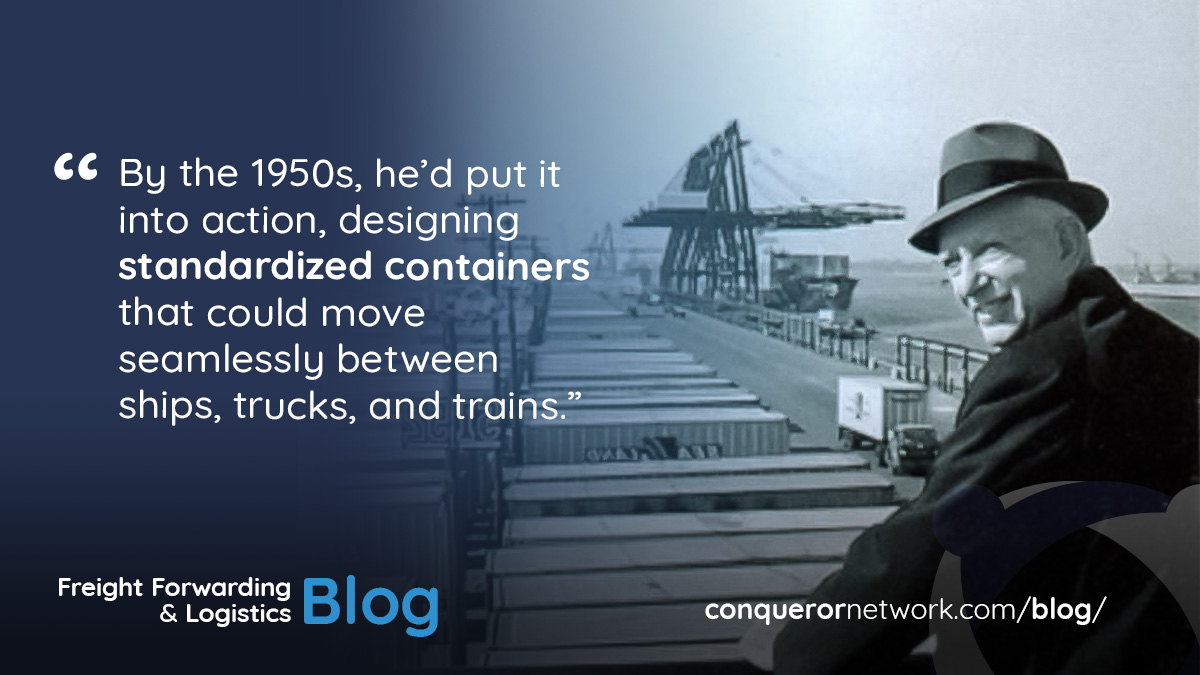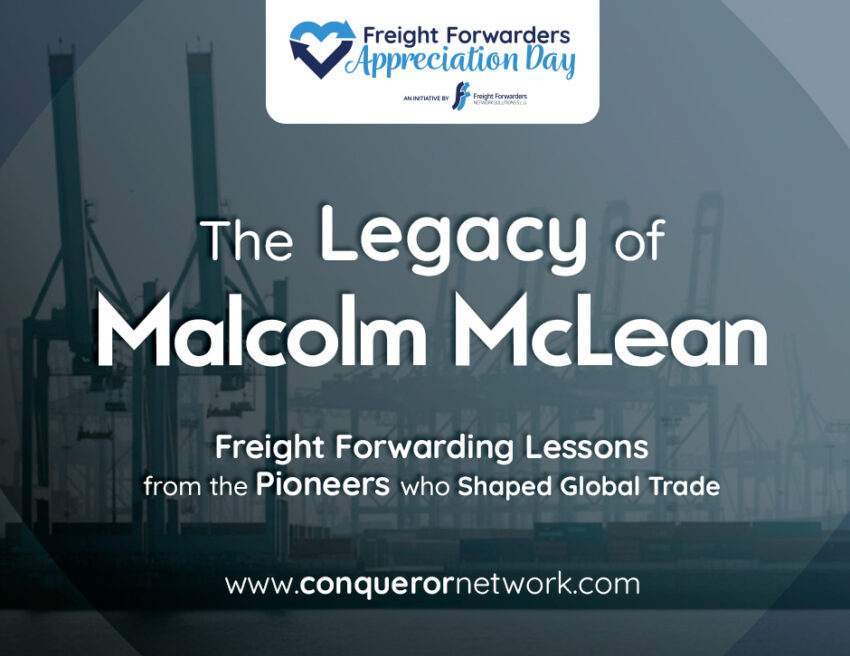Every great industry has its trailblazers, the ones who looked at the chaos and saw potential. In logistics, that visionary was Malcom McLean, often called the father of container shipping. And as Conqueror Freight Network gears up to celebrate Freight Forwarders Appreciation Day on 14th November, there’s no better time to look back at the innovators who changed the way the world moves.
This special day is all about honouring the people who keep trade flowing, those who solve problems before breakfast and make global commerce look effortless. To truly appreciate them, it’s worth revisiting how one man’s big idea reshaped global trade and what lessons modern freight forwarders can take from his story.
Malcom McLean: The Truck Driver Who Changed Global Trade History
Before he became a logistics legend, Malcom McLean was a humble truck driver in North Carolina. In the 1930s, he spent long hours waiting at ports, watching dockworkers load cargo piece by piece. It was slow, inefficient, and expensive. One day, he wondered: What if the whole truck body could be lifted onto a ship?
That thought was simple but revolutionary and it sparked the Malcom McLean containerization concept. By the 1950s, he’d put it into action, designing standardized containers that could move seamlessly between ships, trucks, and trains. Suddenly, cargo didn’t need to be unpacked and repacked. Ports became faster, shipping costs dropped, and world trade exploded. The impact was staggering. In a few decades, containerization cut transport costs by more than 90% and increased trade volume beyond imagination. It’s no exaggeration to say that Malcom McLean revolutionized shipping and laid the foundation for the global economy we know today.

The Freight Forwarding Pioneers Who Followed
While McLean’s name stands out, he wasn’t alone in shaping logistics. The freight forwarding pioneers who came after him built on his innovation, creating systems, networks, and digital tools that make today’s global shipping possible. From early customs agents navigating paper-heavy trade routes to the modern-day digital forwarders optimizing real-time visibility, the logistics innovation history is filled with people who saw efficiency as both an art and a science. Each of them contributed a piece to the massive puzzle of global trade developing better documentation, inventing smarter tracking, and creating collaborative international freight forwarders networks like Conqueror Freight Network, where independent forwarders work together as one powerful unit. These pioneers didn’t just move cargo; they moved ideas. And just like McLean, they refused to accept that “this is how it’s always been done.”
Malcom McLean and the Birth of Modern Logistics
Malcolm McLean’s invention didn’t just improve shipping; it redefined it. His standardized containers became the building blocks of global commerce. Cities with ports transformed into international hubs, manufacturing globalized, and supply chains stretched across continents.The impact of containerization on modern logistics can’t be overstated. It made it possible for your smartphone to have parts from ten different countries, or for a local business to source materials from halfway around the world. It was efficiency on a scale humanity had never seen.
McLean’s success was about perspective. He spotted inefficiency, challenged convention, and backed his vision with courage and persistence. In many ways, his story mirrors what freight forwarders do daily: finding faster, smarter, more reliable ways to move the world.
Lessons from the History of Global Trade
Perhaps one of the most important lessons from the history of global trade is that innovation isn’t a luxury; it’s survival. Every major leap in logistics came from someone willing to question the status quo. For freight forwarders today, McLean’s story is a reminder that small ideas can create massive change. Whether it’s adopting digital booking systems, embracing green logistics, or improving transparency, innovation starts with one simple question: How can we do this better? The business lessons from logistics pioneers like McLean teach us that progress often begins with frustration, those moments when something doesn’t work, and you refuse to accept it. That mindset is what built the modern freight forwarding industry and continues to drive it forward.
What Modern Forwarders Can Learn from Malcom McLean
What modern forwarders can learn from Malcom McLean goes beyond containerization. It’s about curiosity, adaptability, and long-term vision. McLean didn’t have a background in shipping, yet he changed its future. He believed that logistics was about transformation. Modern forwarders operate in a far more digital, interconnected world, but the principles remain the same: efficiency, innovation, and a relentless focus on solving problems before they grow. Like McLean, today’s freight professionals must balance risk and opportunity, stay ahead of technology, and never stop questioning the way things are done. That’s exactly what Conqueror’s global agents do every day, working across continents, combining traditional know-how with modern solutions, and proving that freight forwarding is as much about intelligence as it is about infrastructure.
A Tribute on Freight Forwarders Appreciation Day
As Freight Forwarders Appreciation Day approaches on 14th November, it’s worth pausing to recognize that today’s forwarders are the inheritors of McLean’s spirit. They may not be designing new containers, but they’re redefining efficiency in their own right, through collaboration, digital tools, and relentless determination. They’re the people ensuring that when the world stops for holidays, global trade doesn’t. And that kind of consistency deserves recognition.
At Conqueror Freight Network, this day is more than a celebration, it’s a thank-you to the professionals who keep the wheels (and ships, and planes) of trade turning. Without them, McLean’s dream of a connected world wouldn’t be possible.
The Continuing Legacy of Logistics Innovation
If Malcom McLean were alive today, he’d probably smile at how far logistics has come and how much it still mirrors his early philosophy: keep improving. His story is proof that one bold idea can rewrite global trade history.
As we celebrate Freight Forwarders Appreciation Day, let’s take a moment to appreciate the continuity between past and present—the vision of the freight forwarding pioneers, the innovation that defines the modern industry, and the unshakable belief that better logistics means a better world. Because at its core, logistics is about connection. And no one embodied that better than Malcolm McLean.


